In the early 20th century, French farce is bolder than that of any other nation. As Nathan (1915) pointed out, “the difference 'twixt a risqué American farce and a risqué French farce is simply this: in the former the plot proceeds toward adultery, in the latter the plot proceeds from adultery. Or, in another phrasing, the American product deals with adultery as a probability of the immediate future, while the Gallic product deals with the probability of adultery of the immediate past being found out” (p 4). In the French version, the sex act has already occurred, in American or British versions, it is only threatened to occur and often never happens. For the Anglo-Saxon public, marriage is a sacrament and institution not to be laughed at, for the French often a joke.
Georges Feydeau
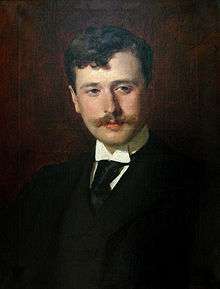
Georges Feydeau (1862-1922) continued his dominance of Boulevard theatre from the previous century with "Une puce à l'oreille" (A flea in her ear, 1907), bitingly satirical and with elements of cruelty most of the genre lack.
In "A flea in her ear", “Feydeau piles complication on complication and what should lead to clarification only help to confuse...Feydeau presents a tableau of alcoholism, prostitution, sexual perversions or inadequacies, and a general attitude toward life which reflects, on the bourgeois level, the same preoccupations that naturalism reveals...The seventh scene of Act 2 is pure nightmare, as the characters are plunged into the absolutely incomprehensible and we the audience attacked though our nerves by the absurdity and extremity of the situations in the most violently physical of vaudevilles. Tournel, turning back from locking the door so that he can better violate Raymonde, leaps onto the bed, which in the meantime has revolved, and finds himself embracing Baptistin. For him as for Raymonde on the other side of the wall, there can be no explanation but madness” (Pronko, 1975, pp 162-164).
“Feydeau offers a play in which neither husband nor wife is even seriously contemplating adultery. Yet it is suspected adultery that sets Feydeau’s infernal machine in motion...Raymonde advocates a double standard usually attributed to and associated with men: she can understand and excuse her cheating on her husband but would not stand for it if the reverse were true. She truly believes that a lover would be satisfied with the gift of her mind and heart...For Chandebise, whose only flaw...is...his conjugal duties, the punishment is utterly out of proportion. Like a Kafka character, he is assailed by unknown forces for incomprehensible reasons” (Esteban, 1983 pp 134-135).
"Feydeau exploits sexuality for its ability to stimulate physical tension throughout the act. His use of the Englishman, Rugby, in this enterprise is particularly interesting. Established from the onset as satyrism incarnate, Rugby is always on the prowl, his door left invitingly open: a trap which Raymonde, Antoinette, and Lucienne all enter...Raymonde and Lucienne both fight their way back out immediately, but Antoinette, the fun-loving maid, stays on after Camille fails to rescue her, later rushing out with her blouse clutched around her when her husband stumbles into the room. It is Rugby who is also one of the most violence-prone characters on stage, wrestling with all the women and brutally assaulting Camille and Etienne and Chandebise...Feydeau handles psychology well, but his real genius lies in the aesthetic structuring of physical movement...His characters constantly change direction, running first for one door, then racing for another. They also chase up and down the stairs- twenty-four times in all...Feydeau uses choreographic distancing...to create a sense of detachment in the audience...An example...occurs...as Chandebise himself, arriving at the hotel, temporarily escapes from Histangua by taking refuge in Rugby's room. The Englishman, interested only in having girls in his room, shoves Chandebise out- and the noise of their struggle attracts Ferraillon, the owner, to the scene....Feydeau makes the physical action into an ensemble dance...building of the physical tension he has so artfully created into a kinesthetic climax...Feydeau himself announced the principal rule of construction for his intrigues: 'when two of my characters absolutely must not meet, I bring them together as soon as possible.' It should be added that he always throws them together literally nose to nose, with a sure sense of theatrically effective movement. Thus, when Raymonde and Tournel first meet in the bedroom of the hotel, Feydeau goes to great lengths to make sure that they will not at first see one another across the room but face to (bruised) face...Feydeau uses this principle eight more times in the act...As Eric Bentley has correctly postulated: 'the theatre of farce is the theatre of the human body' (The life of the drama. New York: Atheneum, p 252, 1970). As much as any other dramatic form, farce reminds us that theatre remains more a Dionysian ceremony than an Apollonian one" (Parshall, 1981 pp 359-364).
"A flea in her ear"
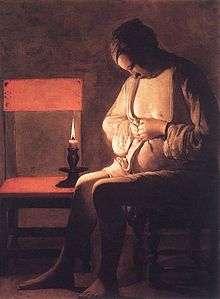
Time: 1900s. Place: Paris, France.
Text at ?
As a result of her husband's impotence towards herself, Raymonde Chandebise suspects him of having adulterous relations. To test that idea, with the help of her friend, Lucienne, she composes a letter from an unknown woman for a lover's rendezvous with him at the Minaret Galant. Chandebise cannot believe the letter is meant for him, but rather for his friend, Tournel. By chance, Chandebise shows the letter to Lucienne's jealous husband, Homenidès. "Caramba!" he cries, "My wife's writing!" Homenidès warns Tournel to avoid going there, but yet Tourney does. When Raymonde arrives at the Minaret Galant, she asks for Chandebise's reserved room, as does Tournel when he arrives. While sitting on the bed, Tournel draws the curtain as Raymonde enters hastily from the changing room. She slaps his face before recognizing the man is not her husband. Unabashed, Tournel seeks to take advantage of the situation. While Raymonde hesitates on whether she should accept, she inadvertently presses a button which turns their bed around through the wall while the bed in the next room revolves into theirs, a bed occupied by an old man, Baptistin, who complains of rheumatism. The revolving beds are meant to serve as a front in case police officers appear in the hotel rooms. Fearing the old man, Raymonde rushes out of the room and heads downstairs, then runs upstairs four steps at a time after seeing her husband arrive though disguised as a servant. She precipitously enters a room with an open door, occupied by a lusting Englishman named Rugby. She comes back out struggling to get away from him, intent on slapping his face which Tournel, trying to help her, receives in his place. Seeing Baptistin still in their room and hoping to rid themselves of him, Tournel presses the button, after which a servant named Poche is seen on the revolving bed, wearing the same costume as Raymonde's husband and closely resembling him in feature. In fear, Tournel cries out: "My friend, my friend, don't believe what you see." "Pity! Pity! Don't condemn until you hear me," Raymonde cries out. Both fall at his feet and beg to be beaten, but obtain no response. "Anything is better than that frightening calm," Raymonde declares. When Poche appears ready to forgive, Raymonde asks for a kiss, as does Turnel. Meanwhile, informed about the letter, Chandebise's nephew, Camille, arrives and asks for his usual room under the assumed name of Chandebise. Seeing Poche, he also mistakes him for Chandebise and, to avoid him, runs quickly inside the first room he sees, Rugby's again. To rid themselves of Baptistin a second time, Raymonde presses the bed button and this time beholds Camille on the revolving bed. Raymonde and Tournel run away from him, but are forced to run back up again after seeing Etienne, her servant, on the stairs, who warns her that Chandebise knows everything. Incensed at being invaded by a stranger, Rugby pushes Camille out of his room and hits him on the mouth. The blow causes him to lose sight of the speaking apparatus he needs to be understood. Etienne knocks and enters inside Rugby's room, where he discovers his wife in bed with an unknown man. Mistaking him for Chandebise, Etienne stops Poche in the corridor and complains about being a cuckold. Lucienne arrives on the scene, followed shortly after by Chandebise, who admits having shown her letter to Homenidès. They run downstairs but run back up again on seeing Homenidès with a revolver in his hand. Chandebise is pushed out of his room by Rugby and confronted with the hotel manager, Ferraillon, who, mistaking him for his servant, Poche, verbally and physically abuses him. After being pummeled, Chandebise sees his wife accompanied by Tournel. He angrily seizes him by the throat until Ferraillon comes back to berate him again as Turnel makes his escape. The worried Homenidès forces his way inside Camille's room and accidently turns the bed button. On the revolving bed, Lucienne and Poche appear, both disappearing after seeing the revolver in her husband's hand. Later, at Chandebise's house, Poche asks Raymonde whether he can see her husband. Still mistaking him for Chandebise, she, Tournel, and Lucienne all believe the man to be mad or drunk. Poche is taken away to sleep in Chandebise's bathrobe as Chandebise himself arrives, asking Tournel once more the reason why he found him with his wife at the hotel. Disgusted at these confusions, he chases them away. Ferraillon enters to give back Camille's speaking apparatus. Mistaking him again for Poche, Ferraillon heaps further abuses on him. Chandebise disappears only to find the threatening Homenidès, when once again he makes his escape. When Homenidès finds a copy of the letter among Raymonde's papers and asks her the meaning of this, the question is finally resolved by his wife. A stunned Chandebise returns to say he saw his own person in his bed while Ferraillon returns to berate him again until Raymonde reveals he is her husband, all this trouble because her husband's impotence had put a flea in her ear.
Sacha Guitry
.jpg)
The most important figure in the 1915-1945 span of Boulevard theatre is Sacha Guitry (1885-1957), with comedy-dramas such as "Le nouveau testament" (The new testament, 1934) and "Deburau" (1918). "The new testament" concerns what happens when a man's coat is found with his testament in one pocket, so that he becomes falsely declared to be dead. "Deburau" concerns the life of Jean-Gaspard-Baptiste Deburau (1796-1846), a pantomime working under the stage-name of Baptiste.
In "Deburau", "the story of the play is a Pierrot story from beginning to end. What are the two experiences in reaction to which Pierrot shows that sentiment which is peculiarly his? Entirely sensual, yet airily tender, hopeless love, and the tragedy of old age...There is nothing in poor Pierrot’s philosophy to fight these ills which he feels so keenly. Still, he has one resource, namely indulgence in an exquisite, slightly mocking self-pity. His escape is, indeed, to make a beautiful little work of art out of that unattractive emotion which we usually handle so clumsily- self-pity...I do not believe a thorough Englishman can act Pierrot at all; he is a child of the Latin zone, born beyond the influence of Northern tenderness, though he in a different way is tender, and of Northern seriousness, though in his way Pierrot too is serious. The prime requisite of a Pierrot is complete absence of reserve and of all fear of emotion, and where, I ask you, will you find that, either in art or life, on this island? If this play, for it is a very pretty one, does not attract, it will be due chiefly to the flatness of the last act, which seems on the stage to drag and drag and then suddenly just stop. The part of Charles Deburau in this scene, Pierrot’s young son, is an exceedingly difficult one to play; he must suggest the timid eagerness yet truthless impatience of young talent which seizes hungrily its opportunity. We must be convinced that when he leaps on the stage he will inherit that very night his father’s fame. If we do not, the conflict of emotions in Pierrot himself will not seem moving, nor will the irony of the crier’s bawling to the public outside to come in and see a new Deburau as wonderful as the old, make touching the son’s sudden revulsion of emotion, when, feeling at last, like a stab right through him, absolute certainty he will inherit his father’s fame, he flings his arms round him, crying- the happy supplanter- 'No, no. It is not true, father. Why does he lie like that?'" (MacCarthy, 1940 pp 70-72).
"The new testament"
Time: 1934. Place: Paris, France.
Text at ?
After finding a new position for his secretary, John, a doctor, must find another one to replace her. His wife, Lucy, suggests Fernando, son to a friend of his, Adrian, a radiologist, but he hires instead Juliette, whom Lucy immediately detests to the extent of provoking her in the hope that she will lose her place. John is late to dinner at his house on a night when Adrian and his wife, Margaret, are invited. A messenger leaves behind a coat, inside which a worried Lucy discovers an envelope addressed to her husband's notary as well as his last will and testament. She faints. According to this new will, Lucy gets only one third of his fortune, the other parts going to Madeleine and Juliet Courtois, two women whom she has never heard of, but she guesses that Juliet is the woman her husband has just hired as secretary, the other being her mother. Lucy is all the more upset on reading the written date: 25 April 1934, thinking her husband probably committed suicide on this very day. In addition, the will also mentions "a son, who, without knowing it, avenges his father's honor," by which she discovers that her husband knew about her adulterous relation with Fernando. It is Margaret's turn to faint when her adultery with John from 25 years ago is mentioned. Unexpectedly, John himself enters amid the distraught group and finds his coat left by mistake at his tailor's, but without the envelope, hidden underneath Lucy's dress. The following morning, John learns from Margaret, veiled like a widow for the sake of secrecy, the entire story of last evening's events. Despite the awkwardness of the discovery, Margaret declares that their relation together was "the only agreeable moment of my existence". John does not reveal to her whether Juliet is his mistress, or else her daughter, neither does he reveal to Juliet who her father is, but she guesses it is he himself. Later, Lucy, joined again with their friends, sees the butler wearing John's coat, a sign which prompts her to think her husband has committed suicide. But once again he enters in great shape, revealing that he has decided to take part in a foreign delegation of doctors and to take Juliet along with him as his secretary. Lucy looks at Fernando, for them a good opportunity to continue their relation, she considering that to cheat in love "is to wish for happiness". Before going away, John lets her know that Juliet is indeed his daughter.
"Deburau"
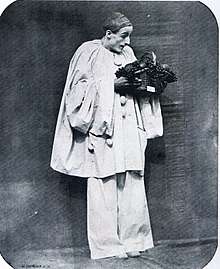
Time: 1830s and 1840s. Place: Paris, France.
Text at http://www.archive.org/details/deburauacomedya00grangoog https://archive.org/details/cu31924027399421 https://archive.org/details/deburauacomedya01grangoog
Jean-Gaspard Deburau, a successful pantomime at the Funambules Theatre under the stage name of Baptiste, receives a bouquet of carnations sent by one of his fans. A lady arrives to lead him away from the theatre, but, after he takes out his wife's picture, she abandons that plan. A second woman arrives, roped with diamonds and a camelia on her belt, Marie Duplessis, a noted courtesan. To her, he does not show his wife's picture, but she is not the one who sent him flowers. It is the employee at the cashier's desk, pining for him uselessly. Deburau is taken with Marie. "I adored the sun," he says, "I like today the rain as well as the sun." Deburau is constrained in an unhappy marriage and, were that possible, wishes to marry Marie instead, his lady of the camellias. She answers yes because it is impossible. After he leaves, Marie admits to a conjurer friend that she loved Deburau only for a day or so. His wife having left him, he joyfully returns with Charles, his ten-year-old son, a dog, and a bird-cage at the very moment Marie is already in the arms of a new-found love, Armand Duval, yet he expects to see her again. Seven years later, Deburau is still expecting Marie to come back. When Charles tells him he would like to become a mime like him, he disagrees with that choice, emphasizing the difficulty inherent in making a living out of that art, encouraging him instead to become an actor at worst. Surprisingly, Marie returns, the result of a friend's intervention on his behalf since Deburau leads such a hermit's life and appears to be sick. When he discovers she came only to look after his health, he loses interest in her. A doctor arrives to encourage him to take up various hobbies. Reading? "I prefer death without words," he retorts. At last, he decides to return to the stage, but, older now, is unsuccessful. As he is about to speak to his disgruntled public, he finds himself unable to. He kisses them goodbye instead. The curtain closes on him sadly and slowly. The last curtain falls on him like the guillotine, "for a soldier, it is the flag that one throws on his coffin," he declares. The theatre director must now replace him with a journeyman, but Deburau has a better idea: put Charles on, whom he starts to coache on the spot.
Marcel Achard
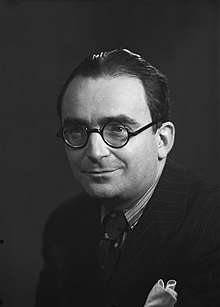
Marcel Achard (1899-1974) competed with Guitry at his best with satires on domestic confidence with "Colinette" (1942) and on boyhood friendship with "Patate" (Potato, 1957).
"In 'Potato', the triangle becomes a pentagon involving two married couples and an adopted orphan. The hero is a disenchanted inventor called Rollo who wastes his time alternately hating a successful rival, Carradine, and borrowing large sums of money from him. Rollo's 18-year old adopted daughter, Alexa, represents modern youth, although she claims that 'it is old-fashioned to be modern'. Her language would shock American parents into some measure of protest or discipline, and, while her actions speak softer than her words, she is 'quite a number', as Carradine's wife, Véronique, says. In describing how she turned down a proposition, Alexa says: 'Two propositions a week, that's my average...the last one was last night...not very interesting...done entirely by gestures...and answered, too: my hand on his face. Then he called me a little whore...This gave me the chance to reply: 'thanks for telling me. Now I don't have to prove it.' Beneath this wise-guy attitude, Alexa is an unhappy girl who longs for the marital security that her adopted parents enjoy. Her love affair with Rollo's old friend-foe, Carradine, is discovered when her adopted mother finds some highly compromising love letters. Rollo thinks that they are intended for his wife, and Alexa is forced to confess that they are her own, refusing, however, to name her partner. The irascible 'Patate'- a nickname given Rollo by Carradine, meaning sucker, fall guy, jerk- is determined to find out; the suspense, in shaggy-dog story fashion, leads us to the discovery and promptly bypasses it. Rollo, after elaborate speculations, comes to the idiotic conclusion that his daughter's lover must be the family doctor. Finally he realizes that it is his old friend, Carradine. Characteristically, Achard has Rollo recognize the letter 'Z' which has figured so prominently and humiliatingly in his own search for cash, in the word 'payez' on Carradine's checks endorsed to Rollo. Revenge is sweet. Rollo is almost sick with joy as he anticipates all the humiliations he will inflict on Carradine. But now comes the play's final irony: Rollo can't go through with it. Why not? Simply because he is a nice guy...'Patate' has the elements of a detective story. When, in his apartment, Rollo surprises Carradine who was planning to meet little Alexa there, the humor of the situation is caused by Carradine's surprise and embarrassment. We're laughing with Rollo. But when, a few minutes later, Carradine calmly chooses suicide rather than shame, it is Rollo who becomes funny. As a result of the sudden switch, his revenge has turned sour. Yet Achard never lets his heroes down: their sympathetic quality is established in the first scene, and it is important that the actor know this trait, lest his characterization become unclear" (Mankin, 1959 pp 35-36).
"Colinette"
Time: 1940s. Place: Paris and suburb, France
Text at ?
Wallowing in a Turkish bath, Rivière and Passerose compare how each is mistreated by their respective wives. Rivière complains that his wife pours water on his stomach while he sleeps, cares only to walk when his boots are new, and prevents him from being sexually aroused. Passerose complains that his wife exposes him to what he loves so often that it eventually disgusts him and that she has cuckolded him. Rivière retorts that he is a cuckold, too. Neither is impressed with the fellows who have cuckolded them. Passerose and his wife agreed not to let her lover know that her husband knows, while Rivière’s wife and lover are unaware he knows. A third occupant, Lionel Charmaine, declares that cuckoldry is always the cuckold’s fault, not the woman’s. A fourth customer, Polo, is more skeptical about women’s virtues. More particularly, Lionel boasts about the virtues of his wife, Colinette. “If anyone is sure not to be a cuckold, it is certainly me,” he asserts. Rivière is enraged about such confidence. He bets 10,000 francs that Colinette has or will cuckold Lionel and proposes the experienced Canrobert to do the job. Passerose accepts the bet. But since Canrobert is unavailable, they choose instead Polo, now remorseful for his previous opinions against women. Unaware of the bet, Lionel accepts Rivière’s suggestion of inviting Polo over at his home. During that very first evening, within five minutes, Lionel discovers his wife in Polo’s arms. Nonplussed and to Polo’s surprise, she declares that her relation with her husband has ended and that she intends leaving with Polo immediately, although she admits that she knows little about him. An irate Lionel points out that Polo’s salary is lower than Colinette’s pocket-money. Unperturbed, she is satisfied that Polo has enough to pay for a taxi. She points out that their guest, Armande, loves her husband and tried to convince her to leave him. Armande angrily denies it and leaves immediately, followed by Lionel after expressing vague threats. When they hear the door slowly re-open, both think that it is Lionel. “Kiss me quickly,” she suggests. “And if he kills us, good!” But it is only the triumphant Rivière followed by the dejected and half-believing Passerose, who lets slip the matter of the 10,000 francs to the uncomprehending lovers. Having misunderstood the two friends, Armande returns to reveal that Polo made love to her only to win some money on a bet. Despite the two friends’ denial of Polo’s involvement, Colinette believes Armande. “The romance is over, Polo” she declares. “I can no longer believe you.” When a haggard Lionel returns, Colinette remains still without even turning to look at him. “Put down your fire-arm, Lionel,” she says. “You come too late. There is nothing here to kill.” As a result, Rivière, Passerose, and Armande take turns staying at Polo’s apartment to console him, though since being complimented for his handsome feet, Passerose has gotten in the habit of walking barefoot, caught cold, and can no longer speak. Polo has shown neither sexual interest for Armande nor for her invited guest. “He yawns when I take my clothes off,” she informs them. Before his worried friends, a dejected Polo prepares his luggage for a vaguely planned trip while talking aloud to an invisible Colinette. When the real Colinette shows up, they recognize to have shared the same dreams together though separately. She left her husband six weeks ago, who found her yesterday and has since followed her everywhere. Recognizing Polo’s love for her, she spreads disorder in his apartment as Polo leaves in the next room until Lionel knocks at the door, at which time she pretends to have lived with Polo all this time while re-arranging his apartment while pregnant. Lionel hands her a document stating that she agrees to renounce every material advantage of his fortune and confesses that he knew all along about the bet, regretting his over-confidence.
"Potato"
Time: 1950s. Place: France.
Text at ?
When Leon asks his old school-friend, Noel, for a large loan, he refuses but then accepts to buy off his idea of being able to predict the future based on the tossing of dice. Meanwhile, Leon's wife, Edith, is shocked to discover that their adopted 12-year-old daughter, Alexa, is having an affair with a married man. When Edith asks who the man is, Alexa retorts that "Authority comes too late, poor dear." When Edith opines that Alexa may not find happiness in such a relation, she retorts that "happiness is perhaps not indispensable." The mother insists that Alexa will be unable to have a life with him. "My life!" Alexa exclaims. "You know well that we, the young, have no future." Mother and daughter are unable to keep the adulterer's letters away from Leon, who believes them to have been written to his own wife. "I adore to see you lift your skirt to prove you are right," he reads aloud in a shocked voice. After several series of confusions, Alexa finally reveals that the letters apply to her. And after considerable effort, Leon discovers who the adulterer is, no other than Noel, on whom he plans to avenge himself for a lifetime of torment the man caused him, including being mocked as a school-boy for looking like a potato. Edith is revolted at this plan. Nevertheless, when alone with Noel, Leon threatens to reveal the content of the letters to his wife, Veronica, who in the event of a divorce would make him penniless. Leon jubilates at the thought, considering himself "a potato that is choking you". But Noel surprises Leon by announcing that he intends to commit suicide, since his wife possesses letters proving the existence of illegal financial transactions on his part. Leon is forced to desist. After learning of her lover's situation, Alexa abandons him, preferring to "put a boy between herself and the man". They burn the letters. Despite this move, Veronica guesses the truth, but nevertheless chooses to remain with her husband.
Tristan Bernard
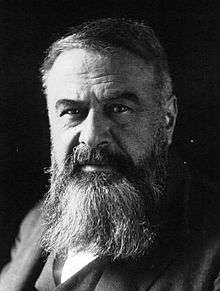
Other comic playwrights rising to the fore include Tristan Bernard (1866-1947) for his satire on boss-employee relations, "Le petit café" (The little coffee-house, 1911). Bernard also wrote "The unknown dancer" (1909) and "In perfect accord" (1911). In "The unknown dancer", during the course of a masked ball, Henry, a poor salesman working at a steel company, meets Bertha, a rich heiress. They become mutually attracted to each other. To impress her father, he is convinced by his friend, Barthazard, to exaggerate the amount of his salary but then develops scruples about having to add continual lies. He writes a letter to the father admitting his fault and eventually obtains a position as a salesman at a furniture store. Bertha's friend, Louise, learns of this and arranges to enter with her and her new fiancée to the store, where Bertha becomes convinced that Henry loves her for herself, not her money. Concerning "In perfect accord", Achilles and Bertha are married without engaging in sexual intercourse since he found out that she has a lover, Maurice. One day, Bertha and Maurice are caught kissing each other by Achilles' blabbermouth secretary. To placate public opinion, they agree to divorce so that Bertha can marry Maurice. Their perfect accord is troubled when Achilles progressively feels unwanted by her. To assure him of their mutual friendship, she and he become lovers again without telling Maurice and so all three return in perfect agreement with each other. She feels like a queen. "I have a serious steward who directs me," she boats to Achilles, "and a worried page whom I dominate.”
"If one were to select a single piece of Bernard's as representative, ['The little coffee-house'] would be entitled to first consideration...There are capital episodes, such as Albert's preparation to fight a duel, abandoned when his second, a general, discovers his low social station; or his defeat, by giving a handsome pourboire to a coachman, of the contention of a union official regarding the poverty of waiters. Here, as everywhere, Tristan Bernard shows freshness of invention, an eye for realistic detail, a love of the logical reductio ad absurdum, high spirits that make the impossible credible, and a power of revealing character in single strokes. His dialogue is graceful and witty, and his fund of good nature is inexhaustible" (Chandler, 1920 pp 171-172).
"The little coffee-house"
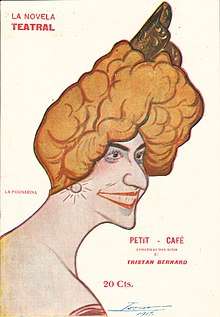
Time: 1910s. Place: France.
Text at ?
Albert grew up as a servant on the castle grounds of the count of Caspion, who suddenly died while travelling around the globe. With no money left to pay for his upkeep, Albert was let go and found a position as a waiter in a small cafe. His girlfriend, Edwige, a popular singer, prefers for the moment not to marry him out of fear that he would choose to live at her expense. One day, Albert's boss, Philibert, learns from his friend, Bigredon, that the count of Caspion's will has been found, stipulating that a huge sum of money (800,000 francs) is left to Albert. Bigredon suggests that he seize the opportunity by binding Albert to a 20-year contract at 5,000 francs per year with a codicil stating that whoever breaks the contract will be forced to pay to the other party 200,000 francs, probably Albert, likely to be unwilling to remain at work after learning of his inheritance. Philibert pretends to be reluctant but then accepts. As anticipated, Albert signs the contract. But after being informed of his inheritance, he unexpectedly refuses to hand over the 200,000 francs. Instead, he tries to provoke his boss into dismissing him by refusing to obey his orders. However, Albert's colleague, a dishwasher, learns that Philibert will bring with him a court-servant as a witness to his employee's irresponsible behavior and so have him dismissed by legal means. On being told of Philibert's plan, Albert resumes his polite and docile demeanor. Now rich, whenever his work-day is over, he often treats his other girl-friend, Bérangère, a courtesan, to expensive restaurants. One evening, Edwige is hired as an entertainer in one such restaurant. Unaware of his new-found wealth, she is startled to discover Albert's presence. To avoid her finding about his wealth and Bérangère's existence, he pretends to have found a second job as a waiter there. Likewise, Bérangère is startled and then angry at his refusal to sit with her and her friends at their table. Eventually, Edwige sees Bérangère caressing her lover's hair, and so the two women fight. When a customer, Gastonnet, gets in Edwige's way, she pretends to have been stuck by him. "If you do not slap him," she tells Albert, "you are the greatest of louts." "Sir, consider yourself slapped," Albert declares. They agree to fight in a duel but, before that can eb arranged, Albert is arrested for disturbing the peace. After being released from jail, he heads back at the cafe, where the head of the waiter's union, intending to show the woes of that profession to a journalist, is unpleasantly surprised to hear about Albert's expensive habits, leaving in disgust. A general is summoned by Gastonnet's friend to organize the duel, but after learning that Albert is a mere waiter, he too leaves in disgust. Finally, Philibert is disgusted at the entire situation and dismisses Albert. However, to his surprise, Albert once more refuses to go after discovering that Philibert's daughter loves him. The father approves.
Jules Romains
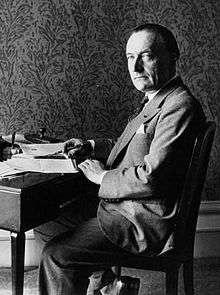
Jules Romains (1885-1972) showed excellence in the boulevard genre thanks to a medical satire, "Knock" (1923).
"Knock"
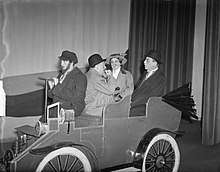
Time: 1920s. Place: France.
Text at ?
Dr Parpalaid leaves a small town to practice medicine in a larger city, handing over his patients to Dr Knock, dismayed to learn how rarely townspeople consult their physician. He first presented this viewpoint in his medical thesis, emphasizing that "healthy people are the sick who ignore their true state". He began to practice medicine without the required degree as a ship doctor and, soon successful, is determined to succeed here as well. His first new idea is to advertise free consultations once a week by the town crier, who mentions in passing how his throat bothers him. Dr Knock asks him to specify whether it is a tickling sensation or a scratching sensation and further asks even more perplexing questions, so that the patient wonders whether he should go to bed at once, but the doctor assures him that he can wait till evening. He asks to see a schoolteacher and is astonished to learn that he and Dr Parpalaid were not in the habit of warning people about the multitudinous dangers inherent in not consulting their physiscian regularly. Knock explains the many functions that can go wrong inside the body and is confident that with the teacher's help the townspeople will be unable to sleep at night. Knock then informs the local pharmacist that his revenues are likely to increase. The pharmacist is dubious, since, to require his services, a man must first become sick, an old-fashioned viewpoint, according to Knock. "For my part," Knock says, "I know only people more or less stricken with illnesses more or less plentiful progressing at a more or less rapid rate." His first patient is a woman complaining of constipation. After briefly examining her and although she does not remember it, he concludes that she fell from a ladder "about three meters and a half high, against a wall". "You fell backwards," he specifies, "luckily on the left buttock." He recommends no solid food for one entire week, warning her that the treatment is likely to be costly. His second patient is a woman complaining of insomnia. He convinces her of the seriousness of her condition, explaining in detail the many malformations of the nervous system that can occur in such cases until she is ready to submit to any treatment if only he can save her. Thus, Knock's private practice, to the pharmacist's content, grows enormously. He waxes lyrical in contemplating the lights in houses at night of his many anxious patients. "The canton cedes her place to a sort of firmament, of which I am the continual creator," he enthuses. Learning of this surprising turn of events, Dr Parpalaid offers him to exchange his present practice with the old one, but Knock refuses, although fully cognizant that his talents must eventually reach a broader stage. A tired-looking Parpalaid wonders whether Knock was joking in insinuating that he appears to need a day of rest. Knock responds that they can see about that later, this said in such a tone that Parpalaid begins to worry about his present state of health.
Jacques Deval
Jacques Deval (1890-1972) excelled in an immigration satire, "Tovaritch" (Tovarich, 1933).
"Tovarich"
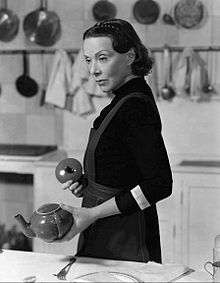
Time: 1930s. Place: Paris, France.
https://archive.org/details/in.ernet.dli.2015.151773/page/n13
Mikail and Tatania, escaped prince and princess respectively in the aftermatch of the 1917 Russian revolution, have difficulty in meeting ends meet in a Paris hotel. The former prince refuses to yield an immense sum of money given to him by the former czar to the heir to the throne. "What a crowned czar gave me, I will return to a crowned czar," he declares. The couple are driven to accept employment as mere servants in the house of a banker, Charles Arbeziat, and his wife, Fernande. To Charles, the ideal servant is characterized by "punctuality, silence, deference." To his surprise, he is very pleased at the kind of service Mikail renders, but is taken aback at his manner of thanks: a kiss on the shoulder in the old Russian manner. To help her mistress who had bought for herself some expensive hats, Tatiana sends away the employee waiting for payment. "I can assure, madam, by St Peter and St Paul, that you will see no bill for the next three months," she promises. But her employer will have none of that. The entire household is pleased with their new servants, including George, their son, who likes to fence with Mikail, as well as Helen, their daughter, who learns Russian songs from Tatiana. But when George starts to flirt with Tatiana, she rejects him. One evening, the Arbeziats invite over to dinner important men involved in an oil deal with Russia, including the people's commissar for petrolium, Dmitri, who, during the revolution, tortured Mikail and raped Tatiana when they were held in custody. One of the guests, Lady Kerrigan, recognizes Tatiana as the former czar's niece and a bank official recognizes Mikail, to the amazement of the Arbeziats. Dmitri also recognizes Mikail and coolly asks for a light for his cigarette. To Tatiana he asks for a glass of water. After he drinks from the glass, she casually mentions that she spit on it. As a result of this discovery and to their grief, Mikail and Tatiana learn that the Arbeziats will no longer keep them in their employ. At the end of the evening, Dmitri enters the kitchen to tell the two servants that he refuses to finalize the deal, thereby preventing French, British, and American influences on Russian soil. Instead, he requests Mikail to deliver the czar's money. Otherwise, a great famine is likely to ensue. Reluctantly, Mikail and Tatiana yield. Dmitri thanks Tatiana by kissing her reverently on the shoulder.
Maurice Hennequin
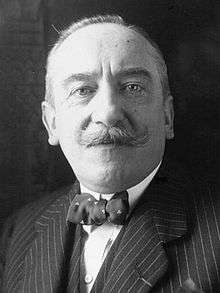
Maurice Hennequin (1863-1926) and Pierre Veber (1869-1942) teamed up for several plays, none worthier and nearest de style of Feydeau than "Vous n'avez rien à déclarer?" (You have nothing to declare?, 1906). Hennequin also wrote with Albin Valabrègue (1853-1937) "Vacations away from marriage" (1887) in which Paul flirts with Edith until her uncle Poulsom appears who expects a marriage offer for his niece. To avoid that violent man, Paul prepares to leave but is prevented by his wife and mother-in-law at the hotel. Hennequin also wrote with Paul Bilhaud (1854-1933) "Nelly Rozier" (1901) and "The Bolero family" (1903). In "Nelly Rozier", Albert, growing tired of his adulterous relation with Nelly whose husband had abandoned her, pretends to be in danger of his life to a jealous wife. However, Nelly discovers the lie and avenges herself by obtaining employment as a servant to his wife, Clemence, to prevent his entering into another adulterous relation with Valentine. In "The Bolero family", Adolph has an adulterous relation with Consuelo Bolero, a star in variety shows, who, together with her family, manipulates him into giving her a great deal of money while offering little in return.
"You have nothing to declare?"
Time: 1900s. Place: Paris, France.
Text at ?
While Samuel Dupont, a magistrate, waits for the return of his daughter, Paulette, from her honeymoon with her husband, Robert de Trivelin, a stranger, Frontignac, asks to see his wife. On seeing Samuel's wife, Adelaide, Frontignac abruptly turns to leave until stopped by Sam who wants to know which woman he is looking for. A camel mechant in Algeria, Frontignac explains that, having recently met a woman he wishes to marry, he is looking for his wife who abandoned him, prior to initiating divorce proceedings against her. Sam informs Adelaide he is expecting to receive a painting he bought in charity from a one-armed old woman, in actuality his 28-year old mistress, Zézé, who, unknown to him, is Frontignac's wife. When Paulette and Robert arrive, the Duponts discover that he has failed to make love to his wife during the entire trip. Their shame-faced son-in-law explains that when he began to make love to Paulette in the sleeping compartment of a train, he was interrupted by a customs agent who asked him: “You have nothing to declare?” since which time he has been unable to have an erection. Showing no sympathy for his problem, the irate Duponts threaten to force him to divorce their daughter unless he accomplishes the expected feat within three days. To help in Robert's plight, Sam’s friend, Couzan, suggests that a visit to a prostitute might solve the problem. Before going to that extreme, Robert cuddles with his wife. However, hearing of his plight, a rejected old suitor of hers, La Baule, interrupts the couple by crying out outside the bedroom door “You have nothing to declare?,” a call sufficient to discourage the unhappy husband. As a result, Robert heads for a whore's apartment, by chance Zézé's, but is followed by the jealous La Baule, another of her clients. While the hopeful husband is putting on his pyjamas, La Baule pays Zézé to hold him off for a day. She agrees and hides Robert’s clothes to prevent him from leaving. However, she is unable to resist making love to Robert, but when at the point of succumbing, La Baule cries out: “You have nothing to declare?,” which once again discourages the astonished Robert, who thinks he has begun to hallucinate. Nevertheless, he finally achieves his purpose but is forced to hide after seeing La Baule enter with the prim Adelaide to present her with evidence that her son-in-law’s impotence is caused by frequent debaucheries. Instead, Adelaide encounters her husband, hiding to discover Zézé’s lover whom he has heard about. To Robert’s amusement, Sam starts to strangle La Baule until the latter proposes that the husband explain his presence at Zézé’s to his wife for the same reason he accompanied her: exposing her son-in-law’s debaucheries. As an added precaution, La Baule takes from Zézé’s servant Robert’s clothes and heads for the police station to accuse him as the local rapist the police have been looking for. To replace his clothes, the cornered Robert calls out from the window to a passing stranger and, once inside, threatens to shoot him with a false forearm unless he yields his clothes. The passing stranger, by chance Frontignac, feels forced to accept. On leaving, Robert promises to return his clothes as Sam re-enters to confront Robert. To his astonishment, Sam discovers Frontignac instead, who plays him the same trick Robert did. When Zézé re-enters, she encounters a husband overjoyed at finding her at last as the police arrive to arrest the accused rapist, seemingly the almost naked Sam unable to make himself heard. Meanwhile, La Baule presents Adelaide with Robert’s clothes as evidence of her son-in-law’s proclivity towards debaucheries and, moreover, informs her that he has accused him of being a rapist. However, Robert arrives, sees his clothes spread out, and goes out with them as Frontignac enters with Sam’s clothes. After Frontignac leaves, La Baule presents Paulette with the clothes, but she immediately discovers that they are not her husband’s while Adelaide recognizes them as her own husband’s. In horror, La Baule rushes out after inferring that his future father-in-law, not Robert, was arrested for rape. When Sam after displeasing adventures is able to return home in a policeman’s outfit as replacement of his own, he is informed by Couzan how ill La Baule has served him. Robert re-enters, puts down Frontignac’s clothes, and attempts to make love to his wife, who, disgruntled at these events, locks herself inside her room. Meanwhile, the Duponts’ servant has discovered Sam’s police uniform under his wife’s bed. In danger of being accused of infidelity by his wife, Sam seizes the opportunity by accusing her of sleeping with a policeman. However, he becomes distraught when Frontignac re-enters to ask him to serve as witness to his wife’s infidelities. Although Robert is also in a position to reveal his relation with Zézé, Sam continues to refuse him as his son-in-law, as he does Gontran as future husband to his younger daughter when the latter presents him with a certificate from Zézé acknowledging his capabilities as a lover. Although Sam requested such an attestation to protect his daughter, he now refuses him by pretending that this was merely a test of the suitor’s fidelity. He plans to use this attestation to free him from Frontignac’s request but feels all the more cornered when Gontran also reveals he knows about his relation with Zézé. He finally submits to both after discovering that La Baule is another of Zézé’s clients and hands over to Frontignac a signed photograph she sent to the still rejected suitor.
Gaston de Caillavet and Robert de Flers
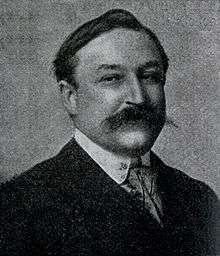
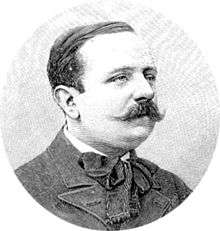
Gaston Arman de Caillavet (1869-1915), Robert de Flers (1872-1927), and Emmanuel Arène (1856-1908) combined their talents in the political satire, "Le roi" (The king, 1908).
"'Le Roi' is the most uproarious of the Flers-Caillavet satires. Imagine, they tell us, the land of the Marseillaise turned topsy-turvy by the arrival of a royal personage! Imagine that personage a boulevardier among boulevardiers. King Manoel of Portugal must have been the original staunch socialist, making love to his wife, and turning the President and his Cabinet into a ridiculous pack of children! Paris is his playground. Received everywhere with acclamations and honor, no wonder he exults and waxes enthusiastic, crying 'How I love France!'...The daring of the plot, the breezy, ample, esprit 'gaulois' are far enough from the quiet sentiment of 'L'Amour veille' and 'L'Eventail'. The authors have entered a new field, in which they are destined to remain the masters, and win further laurels. The occasional vulgarity of 'Le Roi' is perhaps necessary, owing to the theme. To Anglo-Saxon minds there appears no excuse for many scenes in which sensuality per se is exploited for purely comic effect" (Clark, 1916 pp 189-193). "Delicious in its humor is the scene in which, discovering his Therèse and the king together, [Emile] is ready to roar in wrath, but, bit by bit, modifies the tone in which he exclaims 'Sire!' until he fairly purrs" (Chandler, 1920 pp 185-186).
"The king"
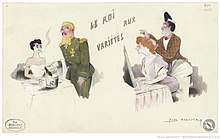
Time: 1900s. Place: Paris, France
Text at ?
Emile Bourdier, industrialist, mayor, and socialist member in the House of Commons, expects to be invited to a hunting trip organized by the marquis of Charamande, one of the hosts during King John IV of Serdania's visit in France, but he is not. He is disappointed at that and also because the marquis refuses to marry his son, Count Serin, to his daughter, Suzette. To avenge himself, Emile attempts to seduce the marquis' mistress, Theresa, an actress. After obtaining a rendez-vous with her, he is so overjoyed that he rushes into the next room to kiss his wife, Martha. In Theresa's boudoir, Blond, in charge of the king's security, enters disguised as a hairdresser to announce his master's imminent visit. Having slept with Theresa eight years ago, the king intends to renew that pleasant experience. Despite Blond's interference, Emile finds her in bed with the king. To mitigate her friend's anger, Theresa announces that the king intends to hunt on his castle grounds, not the marquis'. Overjoyed, the socialist politician kisses the king's hand. At Emile's residence, Martha is anxious about the king's reception and in particular asks Theresa's advice about how to salute his majesty. "One must sense deference at the calf but dignity at the torso," Theresa recommends. As Theresa prepares to leave, Martha insists on having her stay, to Emile's disgust. After the ceremonial duties are over and everyone has gone to bed, the king unexpectedly encounters Martha late at night. Eight years ago while he was parading down a street, she threw at him an apple turnover instead of flowers and hit him in the eye with it. He pardoned this excessive show of enthusiasm by sleeping with her. He does so a second time in her own home. The next morning, Emile discovers his wife in bed with the king. To appease his wrath, Theresa proposes to a round of politicians that they give her husband a new political appointment. They agree in conferring him a minister's post. In gratitude to her cleverness, the king signs a commercial agreement between their two countries, at which Emile beams with pride amid his colleagues as the new minister.
Marc Camoletti
Most singular among French-speaking farces of the 1960s is the airline satire, "Boeing Boeing" (1960), by the Swiss author, Marc Camoletti (1923–2003).
"Boeing Boeing"

Time: 1960s. Place: Paris, France.
Text at http://pvp.org/Play%20Reading/script_boeing-boeing.pdf
One morning at his apartment, Bernard cheerfully says goodbye to Janet, an American flight attendant and soon after greets a second girl-friend, Jacqueline, a French flight attendant, who, in turn, is followed by a third girl-friend, Judith, a German flight attendant. But Bernard is abashed after learning that Jacqueline's schedule has been altered, so that she returns to his apartment with Judith still present. Bernard suggests to Jacqueline that they head to the countryside, while his friend, Robert, remains with Judith. With Judith in another room, Robert is stunned on seeing Janet enter, because her plane was forced back as a result of a snowstorm. As she walks towards the kitchen, Judith is puzzled at discovering an unknown travel bag on the floor (Janet's), which Robert explains away by saying the bag is his. When she leaves, Janet re-enters and wonders why he is holding on so tightly to her travel bag, only to find Judith's bag, which Robert explains by saying it is his. Bernard returns alone because he and Jacqueline quarrelled in a restaurant and he does not know where she is. He proposes to Janet a walk in the country-side as he did with Jacqueline. But when Jacqueline suddenly returns, Bernard quickly ushers Janet out into another room. Jacqueline is equally puzzled at seeing Judith's travel bag, whose presence Robert explains by saying it is his. With Judith out for a walk and Janet in the bathtub, Jacqueline proposes to take a bath, too, but is prevented by Robert, who says it his turn, at which Bernard agrees. After they successfully usher Janet in the adjoining room, Judith surprises both men by saying she loves Robert just at the moment when Jacqueline returns from her bath. To her, Bernard introduces Judith as Robert's betrothed and Jacqueline as his. When Judith wants to know more about this matter, the two men interrupt her with inane discussions. After the two other women leave, Janet declares having received a letter from a millionaire who announces his intention of marrying her, which she intends to accept. For once, Bernard is all alone, and, to his regret, soon to be married.
Pierre Barillet and Jean-Pierre Gredy

Also of comic interest is a woman in her forties worth "Quarante carats" (Forty carats, 1967) by Pierre Barillet (1923-?) and Jean-Pierre Gredy (1920-?).
"Forty carats"
Time: 1960s. Place: Greece and Paris, France.
Text at ?
While on vacation in Greece, Lisa, a 42-year-old head of a real estate agency, has car trouble and no choice but to stay put until the following day at a deserted area near a beach, where she meets William, a 22-year-old student, also on vacation, who offers to cook for them both a scorpion-fish he has just caught and then to indulge in a midnight swim. She accepts. Back in Paris, she unexpectedly meets William at her home, who, unaware of who she is, offered to escort her daughter from a second marriage, Annick, for a night with her friends. Despite their making love in Greece, William and Lisa pretend to meet for the first time. Lisa's mother, Monette, is favorably impressed by the young man, all the more so after learning he is the son of a man who owns a textile factory from her home town. A few days later, William goes over to see Lisa at her place of work for dinner, but she refuses and will have no more to do with him. However, when her mother arrives wet from the rain, he offers to take them home in his car. That same evening with Lisa about to go out to dinner with a rich client named Eddy, Harvey, her first husband and ongoing parasite, arrives unexpectedly. Instead of going out, Eddy proposes that they all eat together right there. The next day, Harvey tells Lisa he approves of her being courted by Eddy. "It is high time you were a bit spoiled," he affirms. "You mean who would spoil both of us," she retorts. She is disappointed when Eddy cancels their date for business reasons and irritated on finding William at her door. William wants to continue their relationship, but, concerned about their age difference, she resists the temptation. Their talk is interrupted by Monette, glad to find her young man there once more, since she is convinced that his outward friendliness towards Lisa is motivated by his desire to court Annick. At cards with him, Monette reveals that she is ready to help him out in his amorous quest. Thinking that she has guessed his pursuit of Lisa, William considers her suggestion of a possible marriage. "One must perhaps ask Lisa what she thinks of it," he suggests. "I think I may tell you that she will greet your proposal very favorably," she answers. That remark surprises him. "You have for you love and money," she continues. "One really asks one's self what could possibly stop you." Alone with Lisa, William asks her to marry him. She declines, but, after he leaves, she reveals his offer of marriage to Monette and Annick. Monette sinks into a chair in woeful disbelief. When Lisa next meets Eddy, it is her turn to be surprised after discovering that he wants to marry her daughter, not her. She hesitates to approve, considering their age difference, 45 and 18. But this presents no problem to Monette, who kisses her granddaughter enthusiastically. Lisa next reveals her marriage proposal to Harvey, who considers it a joke. His negative attitude spurs her to accept the marriage proposal. William's parents approve, especially the mother who enjoys an extramarital relation with her son's college friend. Meanwhile, the aggrieved Monette is powerless to change her daughter's mind. Month is now too embarassed even to play bridge with her friends. The irritated Harvey is equally unsuccessful in mocking William. The night before Lisa and William are to depart to Mexico to marry, Harvey tells her he is joining a friend in Africa. "I have no intention of becoming the inseparable friend of your young household," he announces. When the doorbell rings, she is convinced that it is Harvey's young girlfriend from an apartment nearby and, to compromise him, places his cigar much in evidence on the table. Instead it is William who has brought sleeping pills for her. On seeing the cigar, he assumes the worst and leaves abruptly. Unable to face him again, Lisa writes her fiancee a letter to cancel their marriage plans and gives it to Harvey to deliver. Recognizing at last that his ex-wife's happiness is at stake, he does not deliver the letter so that Lisa and William are once again reconciled.
Jean Poiret
_-_53Fi2472.jpg)
"La cage aux folles" (The birdcage, 1973) by Jean Poiret (1926-1992) is the best vaudeville play of the 1970s. Poiret also wrote “Happy Easter” (1980) in which Steve, a wealthy businessman, is caught with Julie when his wife, Sophie, unexpectedly shows up on Easter weekend. He is led to introduce Julie as the pregnant daughter of his former wife. To his horror, Sophie sympathizes with Julie to the point of encouraging a marriage plan between her and Frederick, the son of his potential business partner. Things worsen for Steve when Julie’s mother, Marlene, shows up, so that Sophie is ready to relinquish Steve to her and take care of Julie’s supposed baby.
"The birdcage"
Time: 1970s. Place: St. Tropez, France.
Text at ?
Larry asks his father, George, owner of a homosexual night-club, to change his apartment into a more austere one, because he plans to marry a woman whose parents, the Faithingods, have ultra-conservative views and he has invited them over. George asks his friend, Albin, to adapt his behavior to a more virile type, like their butcher's, but he is unable to and is ordered to stay away. When Mr Faithingod arrives, he notices the night-club sign outside and remarks: "Freedom, granted, but freedom with decency." "Absolutely," George hypocritically concurs. At the supper-table, Mrs Faithingod asks about the figurines on their plates: "Are these young men playing together?" she naively asks. George reassures them on this and other matters, but is disagreeably surprised to find Albin entering the room as his wife. The Faithingods are surprised at seeing the soup-bowl in the form of a man's breast while George and Larry, another friend, have a hard time controlling Albin, close to compromising them several times. When a knock on the door is heard and the doorbell rings, George tries to camouflage the sound, but finally his estranged wife, Simone, enters, whom he introduces as the cleaning woman. Although their guests retire for the night, Mr Faithingod, finding his room too hot, comes out again to find Albin appearing as a man, introduced as George's brother-in-law in beach attire. "Was the sea nice?" asks Faithingod. Albin compromisingly responds: "O, like a caress." Mrs Faithingod then comes out for the same reason, at a time when the apartment is invaded by employees from below-stairs, which George explains by announcing he is organizing a masked ball. At last the Faithingods discover the awful truth, but are prevented from leaving when journalists enter to take photographs of the premises. The homosexuals offer the couple some transvestite costumes to escape detection. "I hope the people of France will be thankful to us," Mrs Faithingod painfully remarks as the couple are forced to dance with the rest.
Francis Veber

"Le dîner de cons" (The dinner game, more precisely The fool dinner, 1993) is the best Boulevard comedy of the 1990s, written by Francis Veber (1937-?).
"The fool dinner"
Time: 1990s. Place: Paris, France.
Text at ?
Pierre Brochant, a Parisian publisher, is in the habit of organizing a "fool's dinner" with friends, each inviting a fool they can safely ridicule without his being aware of it. For this purpose, Pierre discovers François Pignon, a government employee with a passion for constructing famous landmarks such as the Eiffel tower with matchsticks. But before Pierre can introduce him for dinner, he hurts his back and asks François to locate his wife, Christine. But to Pierre's despair, François involuntarily reveals to her over the telephone the existence of her husband's mistress, Marlene, and, when Christine arrives, sends her away, mistaking her for Marlene. Juste LeBlanc, Christine's old lover, is solicited to help Pierre, but laughs at him instead. Pierre considers Christine may have gone to see Pascal Meneaux, a reputed philanderer, but he does not know how to contact him. Unfortunately, François tries to help by asking Lucien Cheval, who works at the revenue service and knows about Pascal from his work-file. Before Lucien comes over, Pierre is stunned to learn he is an income tax inspector, quickly hiding valuable paintings and decorations the government knows nothing about. While calling up Pascal from Pierre's apartment, Lucien discovers that his wife is at the apartment of the philanderer, and is so chagrined and angry that he leaves at once, threatening Pierre of an in-depth audit on his earnings. At last, François discovers the hidden purpose behind Pierre's dinner. Though hurt, he nevertheless calls up Christine in secret to help Pierre out, lying that he is calling her from a phone booth to avoid her thinking his friend put him up to it. But he blunders yet again by answering the phone in her husband's apartment, so that husband and wife are estranged more than ever, to Pierre's despair at ever inviting such a fool to a fool dinner.
Marcel Pagnol
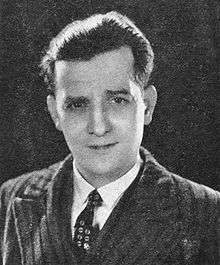
In addition to comedy, Boulevard drama is a viable art when provided by Marcel Pagnol's (1895-1974) "Marius" (1929).
"Marius"
Time: 1920s. Place: Marseilles, France.
Text at ?
A port-bar owner, Cesar, tells his son, Marius, that he considers him "soft and lazy", "a dreamer", of litle use at work. While Marius tends the bar in his father's absence, Panisse, prosperous owner of sailing equipment, courts his childhood-friend, Fanny, a sea-side vendor. Panisse gazes so intently inside her cleavage that the two men quarrel. Panisse prefers to walk away rather than fight but proposes a deal to Fanny's mother, Honorine. Should she agree to his marrying Fanny, he will yield a rich dowry for her daughter and a pension for her. Honorine reveals to Cesar the possibility of her daughter marrying Panisse. In turn, Cesar questions Marius about his feelings towards Fanny, who answers he is unsure of loving her sufficiently for marriage and of the existence of another woman he is not inclined to let go, but the real sticking point is his secret desire to head to sea. Fanny refuses Panisse and seeks to delve into Marius' feelings for her. "I love you, and, if I could marry, it would be with you," he answers. But yet he feels the sea calling him. "I long for elsewhere," he admits. One day, Honorine comes charging into the bar, angry and weeping, with Marius' belt in her hand. She found him sleeping with her daughter and tells Cesar she wants them married at once. Meanwhile, Marius strikes a deal with the quartermaster of a ship leaving port, but still hesitates about whether he should leave. Fanny reassures him. "I am not a trap, Marius," she says. "Since you prefer the sea, marry her." She will nevertheless wait for him during his three-year voyage. At the bar, she calls Cesar over and distracts his attention while his son slips out without being noticed towards the port.
Jean Cocteau
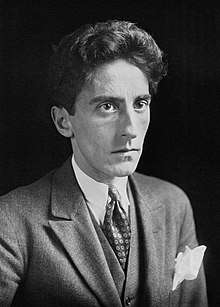
Although no life-long boulevard author as such, Jean Cocteau (1889-1963) contributed one striking play of the genre: "Les parents terribles" (Intimate relations, more precisely Terrible parents, 1938, although the French word is nearer the English word "obnoxious").
"A rapid examination of Les Parents Terribles might lead one to see in it an old fashioned melodrama. It is much more. In addition to being one of the most skillfully constructed plays of Cocteau, it is one of the most poignant, in a tragic sense. The theme of 'order', apparent in all of Cocteau's writings, is here more dominant than ever. The character Leo is a new Electra who has the passion for establishing order everywhere. Yvonne, the mother, is the tragic heroine who refuses to see herself and who succumbs to the domination of disorder" (Fowlie, 1942 pp 465-466). "Ever since Michel's birth, Yvonne has more or less abandoned her husband in order to devote herself to her son. It is with Michel that she is in love, and she does her best to keep him at home and in a state of childish dependence. She refuses to let him take a job, denies him spending money, and will not hear of him taking a drawing class in which there are nude models! The sexual undercurrent in Yvonne's love is made quite explicit from the start: we see her hurriedly powdering her face when she thinks that Michel is about to arrive; and, when Léonie tells her that Georges is seeing another woman, her protestation contains an especially revealing slip of the tongue: "Without doubt Michel cheated on me, too, I mean lied to me, too'...Kept close to Yvonne, infected by her disorder, Michel possesses the disconcerting naiveté of a child...There is something slightly endearing, no doubt, in the family's childishness, but there is also something suspicious...No doubt we could add that Georges is a "père enfant" who cannot escape from the imaginary universe of Jules Verne and whose every step in the play is directed by his sister-in-law" (Bach, 1993, pp 32-33).
Agate (1944) wondered about this play as follows: “sitting in the theatre the other evening I tried to put myself into the position of the young man in this play and to ask myself which, as a young Frenchman, I should find the more shocking— the revelation that my fiancee’s former protector was my own father, or the fact that by pretending to be in love with me she was carrying on an affair with yet another man. I found I had no difficulty whatever in deciding that the second alternative was the more terrible. What, then, would have happened if the young lady, putting herself in the boy’s place, had realized this, and then declined to be blackmailed?” (p 203). But she chooses the first because it takes into account not only her young man’s pain but the father’s, whereas the second does not. Léonie is on one hand “the voice of reason who explains the characters to themselves...on the other, a frustrated old maid who missed her chance for happiness out of a false sense of dedication to her sister...The impact of Les Parents Terribles comes from the brutal frankness with which it reveals the pathology of a fairly typical bourgeois family” (Oxenhandler, 1957 pp 187-192). “Nowhere else does Cocteau succeed so clearly as a man of the theatre, nor does he display in his other works the depth of character study that he has here created...The mother, Yvonne, neglects her husband and saves all her passionate affection for her son...Few plays in the modern theatre have the economy, the telling efficiency of ‘Terrible parents’; we have here a social satire more biting than anything in Becque’s: the lies, petty jealousies pile up for the earth to open” (Lumley, 1967 p 112).
Cohen (2002) demonstrated that "Cocteau based his play on Racine's 'Phèdre', playfully imitating its plot and then comically resolving its conflicts- with one exception- [Yvonne's suicide] and applying ironic twists to the characterization of its dramatis personae- also with one notable difference...In IV.i, Léonie departs altogether from her role as Œnone to become the restorer of order, not a cosmic order such as the gods reestablish in Phèdre, but a bourgeois social order...Cocteau seems to have asked himself what would happen if he took a situation resembling that of Racine's 'Phèdre', eliminated the gods in favor of human free will, reversed the tragic flow of events with a comic reversal in the final act" (pp 56-65).
"Terrible parents"
Time: 1930s. Place: France.
Text at ?
Ivonne, along with her husband, George, and their 22-year-old son, Michael, live in a gypsy caravan on a legacy obtained from her sister, Aunt Leonie, who manages the house for all of them. Ivonne is often careless, not only regarding the condition of the house but also her insulin-dependent diabetes. She is emotionally dependent on her son, to the extent of advising him to refuse job offers so that he can remain with her. The entire household is upset when Michael spends a single night away from his parent's house without calling them up. Ivonne becomes all the more frantic on learning he is in love with a woman named Madeleine. Without learning anything about her other than her age and generosity in occasionally paying for Michael's meals and cigarettes, Ivonne flies into a rage, calling her "a piece of shit", grabbing her son in desperation, and yelling out the window for no reason. Leonie attempts to reason with Ivonne, underlining the sacrifices she has undergone on their behalf, including the love she still feels for George, whom she abandoned for her sister's sake. George is all the more devastated after learning that his son's intended is his mistress. George and Lenonie decide to force Ivonne to let Michael go, to which Ivonne heartily agrees, though not for the same reason. All three go over to Madeleine's house, where Madeleine discovers that Michael's father is her former lover. Left alone with her, George threatens that, unless she abandons Michael, he will reveal the nature of their adulterous relation to his son, so that she would probably lose him in any case. Madeleine is at first unwilling to give up Michael, but finally feels forced to do so. The terrible parents and Leonie reveal to Michael that Madeleine has another lover, which he refuses to believe at first, but, after looking at his silent lover, finally does so. To help Michael recover from this blow, Ivonne smothers her son all the more. Recognizing his egotism in this affair and as an eyewitness to his son's despair, George changes his mind. He and Leonie tell Ivonne that they should reveal the truth to their son, but she resists the mere thought of her son abandoning her again. At the same time, Ivonne correctly guesses that Madeleine was her husband's mistress. Despite her resistance, George and Leonie tell Michael the truth, now overjoyed at the news. As everyone celebrates the lovers' reunion, Ivonne slips away and injects herself, not with her usual dose of insulin, but with a lethal poison.
Pierre Wolff
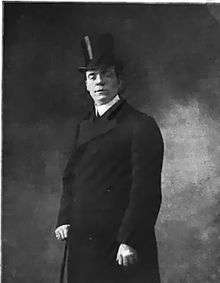
Pierre Wolff (1865-1944) wrote racy dialogue of rare merit in the Boulevard vein and achieved best results in “Les marionnettes” (Marionettes, 1910). His main weakness is usually an undeveloped story-line.
"In his plots, Wolff is never original. Nothing could be more trite than the story of Les Marionnettes (1910), with its husband, neglectful of his wife, but brought back to her side as soon as she piques his jealousy. Here, and in 'L'amour défendu' (1911), what counts is the dramatist's knowledge of the heart and his skill in the use of detail...Supple and pliant in talent, he understands to a nicety the art of play-making. His dialogue is bright and clear, by turns tender or ironic; his pieces are marked by skill in the progress of their action and by their use of contrasts" (Chandler, 1920 p 118).
"Marionettes"
Time: 1910s. Place: Paris, France.
Text at ?
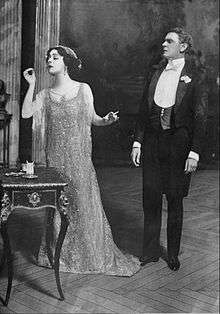
Because Roger, marquis of Monclars, dilapidated his possessions, his mother offered him to live on a fixed income provided he marry her friend, Fernande, a condition he accepts because of the money. Although Fernande says she loves him, Roger does not believe her and in any case has no intention of even pretending to love her, particularly because of her timid manners. He declares his intention of heading towards Nice for a month but all the while stays at Montreux to sleep with his mistress, which she eventually learns about. To excite lust and jealousy, Fernande replaces her modest clothes for bolder ones and starts to flirt and dance with men at social events. Pierre Vareine, once a sympathizer of her plight, is stunned and distressed at seeing her behavior now. She talks with him openly yet no longer wishes to receive the roses he is in the habit of sending her. Roger is even more distressed at her behavior than Pierre, insisting in particular that she stop smoking before others. At the end of a marionette show, Fernande is pleased at the looks of the one representing the guilty woman. “Why should I be made of wood?” she wonders. In Fernande’s boudoir near midnight, Roger’s uncle, Ferney, tries to reconcile the couple but finds Roger cold on this subject. “Let Fernande do as she wishes,” he says. “Having given her no love, I have no right to demand any.” Alone with Fernande, Pierre declares his love, but she is still thinking of the one she lost. “I dreamed crazily, ardently at all childish, passionate things a man I love would know how to say,” she says. “I dreamed. I dreamed. And I met this man and I dressed up this mannequin with my fondest illusions. And all of them fell in tatters.” She is shaken but promises nothing. When Ferney questions Fernande, she says she no longer loves her husband. But when Ferney tests her by lying in having heard her husband say he would return only in the morning, she cries out in distress. Ferney is convinced that she loves Roger and he loves her, but she doubts it. Late at night, she receives a telephone call from Pierre, who asks her to leave her husband. As Fernande says she will think about it, Roger sneaks up from behind and pulls the receiver from her hands, convinced she has already slept with another man. Holding her by the throat, he insists on knowing who he is, but she reveals nothing. The next day, he nervously asks his friend, Nizerolles, about the men he found visiting his wife while he was at Montreux, but is unable to discover who it is. “Everything about her revolted me before,” Roger confesses, “everything about her shakes and attracts me now.” When Ferney discovers his state of mind, he is convinced that she has him now. “You hold the string of the marionette,” he states. “Hold it well or watch out.” Deciding at last to leave her, Roger declares he has left a note to his notary concordant with her interests. “My only regret, you see,” he says, “is of having loved you at the precise moment when you no longer did, because I want to believe you once loved me.” She says she does and as a result he stays.
Edouard Bourdet
Edouard Bourdet (1887-1945) contributed a strong Boulevard drama with "Vient de paraître" (Hot off the press, 1927) about the seedy side of fiction writing.
"Hot off the press"

Time: 1920s. Place: Paris, France.
Text at ?
A book publisher, Moscat, attempts to influence members of an award committee so that one of his authors, Marechal, can obtain a prestigious literary prize, but after learning that the author signed with a rival book publisher, he arranges matters for him to lose the competition, then, to torment him, offers him more money than he had already signed for. Moscat next contacts the publisher of the award-winning author named Mark and buys the rights of the novel. He asks to see Mark, but first meets his wife, Jacqueline, who, without her husband's consent, submitted his work for the prize. She and Moscat convince Mark to quit his clerk's position at the ministry to become a full-time author. But the plan does not pan out. Unable to continue with the second novel, Mark explains to Moscat that the first one was easier, being based on the real-life journal of a young girl. When Moscat finds out the young girl in question is his wife, he proposes that she should enter into a relationship with Marechal, whom he has forgiven and re-hired, and write down a second journal, with which her husband may find once more his inspiration. He invites all three to his villa, but things do not pan out any better there, Mark being unable to get used to Marechal's presence. Meanwhile, Marechal presses Jacqueline to sleep with him, which she is reluctant to do. She discloses Moscat's plan, which incenses him. She then admits she loves him but needs more time to decide what to do. When Mark learns she intends to do a few secretarial chores for Marechal, he becomes angry. Moscat intervenes by revealing his plot to him. Both insist that Jacqueline show her journal, but it is empty. Pressed by her husband, she admits she loves Marechal and intends to go to her parents' house to think matters over. Marechal is about to join her there, but is prevented by Moscat's literary plans for him. As a result, Mark and Jacqueline are together again. She receives a visit from Marechal, not to woo her a second time, but to tell her he wrote a short story based on their relation. When Mark discovers this, he is incensed, but then reveals, to Jacqueline's and Moscat's delight, that he is also hard at work with his own novel concerning a man on the brink of losing his wife's love.
Henri Bernstein
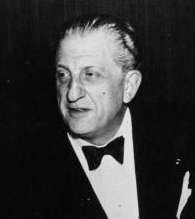
Boulevard grimness achieves a sort of peak with Henri Bernstein (1876-1953)'s "Samson" (1907), when an investor dilapidates his and other people's fortune because of a woman. "Most of all the current French writers, [Bernstein] carries on the Scribe-Sardou tradition, each one of his plays being built to the old specifications around some thrilling situation" (Burrill, 1920 p 47). “Bernstein is held to be the continuer of the Scribe tradition- the effort to get the greatest possible emotional excitement out of three or four acts” (Moderwell, 1972 p 161).
"Samson" "recounts the story of a terrible vengeance...The fearful power of the vengeful Jew, and his repression in the presence of the helpless Le Govain, are depicted in the author's best manner" (Clark, 1916 pp 171-172). "The Jewish banker in 'Israel' (1908), portrayed with no great sympathy, gives place, in Bernstein's 'Samson' (1908), to a Jew as protagonist developing under adversity and eventually winning the admiration of his wife. She, who had married him for his money, had once, out of resentment at this choice of her father, allied herself for an evening with a wretched lover. Her husband, instead of meeting his rival in a duel, invites him to dinner, and announces over the dessert that he has forced down the shares of Egyptian copper, in which both are interested. The ruin he has thus imposed upon his enemy will become his own disaster. His wife, who has already found the lover repugnant, now admires the heroism of her husband, and refuses the freedom that he offers. Jacques, in order that we may share his wife's early distaste for him, is made disagreeable at first, but is later accorded sufficient imagination to render likely his wife's return. As the critic Benoist has pointed out, we fail to think of this inconsistency until after the curtain has fallen, since it is the situation alone that absorbs our attention. As for Jacques, he is the old romantic hero revived, a cousin of Hugo's noble convict and of Dumas' virtuous courtesan. The play was remotely inspired by Lavedan's Le Prince d'Aurec (1892), and more directly by Guinon's Decadence (1901)" (Chandler, 1920 pp 46-47).
"Samson"
Time: 1900s. Place: Paris, France.
Text at ?
Grace is indignant about the sudden way her lover, Jerome, left her once he began to make money, thanks to the financial advice of a sharp investor, James. Despite receiving such favors, Jerome initiates an adulterous relation with James' wife, Anne-Marie. To spite Jerome, Grace reveals to James she has reason to suspect his Anne-Marie is also unfaithful and therefore advises him to pretend to go on a business trip and then surprise her by showing up unexpectedly at his house. He accepts and, as Grace anticipated, does not find her in his house late at night. When he confronts her, Anne-Marie reveals she does not love him any more and admits that Jerome is her lover. As a result, he angrily locks her inside her room. "Do you know, sir, that you have become grotesque?" she asks sarcastically, but promises to remain there. James confirms to Grace that Jerome, her lover, is also his wife's lover. Yet Grace admits she is still hoping to marry Jerome, though conscious he is "incapable of love, but yet a lover." One day, James invites Jerome to dinner. In passing, Jerome mentions he invested even more heavily than he has in the past in Egyptian Copper stocks. Although James is an administrator of that company whose stock they have both profited on, he nevertheless finds that move imprudent. He reveals he has arranged for that stock to fall abruptly at the Stock Exchange, ruining both himself and him, like Samson striking down the pillars over the Philistines' heads. After hearing about the Stock Exchange crash, Anne-Marie's parents and her brother suggest she should divorce James, all the more so after learning he might be arrested for fraudulent practices on the market, but she assures both how he has a minister's word that he will not be prosecuted provided he respects his engagements. Unexpectedly, Anne-Marie declines to divorce him, willing instead to wait and discover whether she can learn to love him.
Marcel Aymé
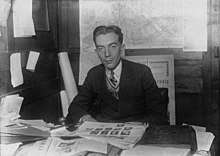
In a manner similar to Bernstein's, Marcel Aymé in "La tête des autres" (Other people's heads, 1952) took up the seedy side of criminal investigations.
"Other people's heads"
Time: 1950s. Place: A fictionalized country called Poldavia.
Text at ?
Court prosecutor Maillard and his family and friends are overjoyed at his obtaining a guilty verdict against Valorin for murder. But Maillard is stunned on seeing the convicted man in his own house, escaped from prison, even more so after learning the disbelieved alibi the innocent man used in court was the truth. Valorin said he was sleeping with an unknown woman at the moment the crime was committed, who turns out to be Roberta, with whom Maillard enjoys an adulterous relation. Roberta wants to hush up the matter, because her reputation is likely to suffer among her worldly friends. When Valorin returns after washing up, Roberta takes his gun and fires, with no result, because he took the precaution of emptying it. Maillard is forced to reveal the truth to Roberta's husband, Prosecutor Bertholier, who, though cursing her, also wishes to keep his wife's adultery a secret, promising with the help of the police to capture the true murderer. In the meantime, Maillard allows Valorin to live inside his house. Valorin attracts the sympathy of his wife, Juliet, seen together in a compromising position by the jealous Roberta. To get the upper hand over her, Juliet lies by saying Valorin is her lover. Roberta believes the lie and reveals it to the angry Maillard. After police investigations, Bertholier thinks to hold in custody the actual murderer, a man named Gozzo, but that does not satisfy Valorin, who wants the complete truth known about his relation with Roberta. Maillard refuses to cooperate, at which Juliet threatens to expose him, having heard him reveal the truth. To keep him quiet forever, Roberta hires two men to kill Valorin, but they mistake him for Maillard until she arrives. Alone with the murderers, Valorin hears them reveal the true murderer, not Gozzo but a man named Dujardin. When the assassins needlessly quarrel over their children's education, he seizes the opportunity of taking away their guns. Stunned at this turn of events, Roberta denies any intention to murder him, intending only to intimidate. They learn the killers work under a mighty kingpin of crime called Alessandrovici. Hoping to free the guiltless Gozzo, Valorin and the two prosecutors visit Alessandrovici, who, a witness of Dujardin's incompetence, agrees to yield him to the police.